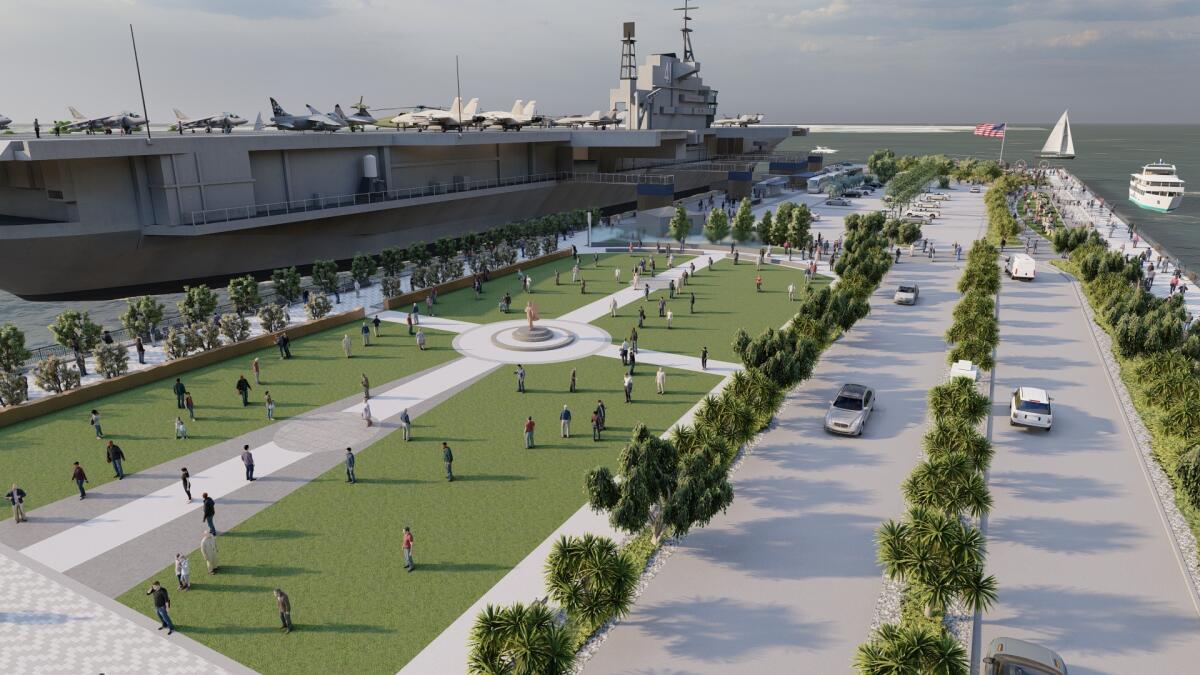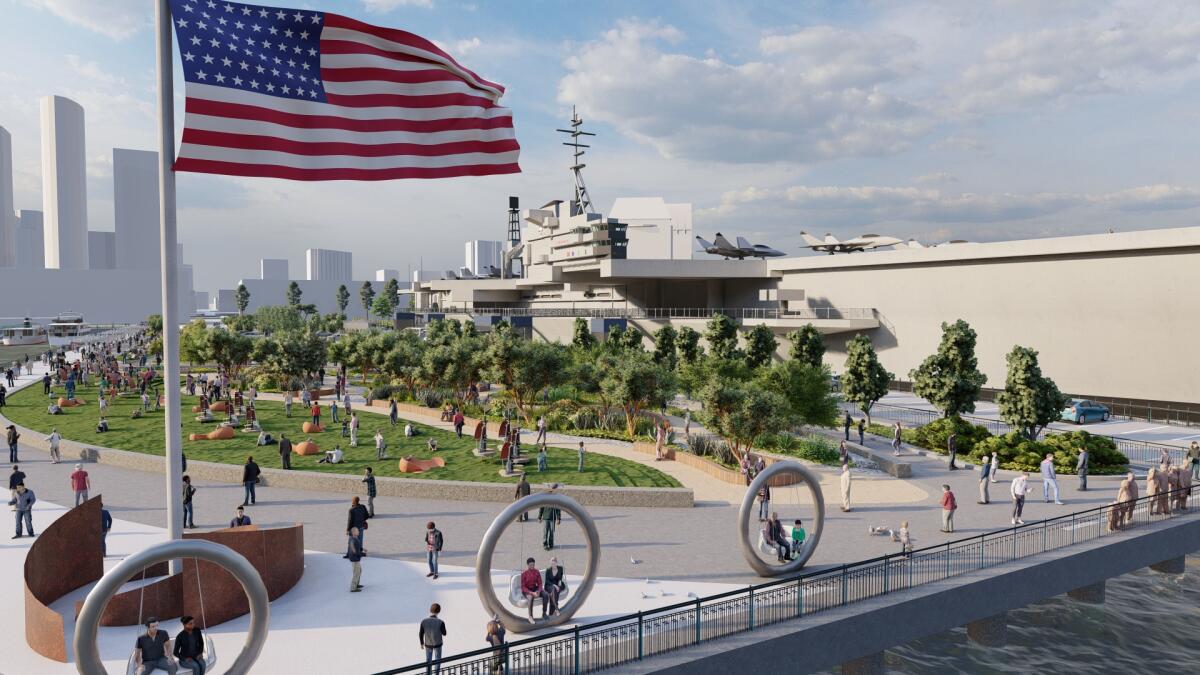USS Midway’s promised waterfront park finally will break ground after a 20-year wait

- Share via
SAN DIEGO — For 20 years, the long-ago pledge by the USS Midway Museum to build a large waterfront park on downtown’s Navy Pier went unfulfilled — until now. By early next year, work will begin on the more than $60-million project that will transform a parking area into Freedom Park, complete with a bay-view promenade and amphitheater.
This story is for subscribers
We offer subscribers exclusive access to our best journalism.
Thank you for your support.
While the new park will require removing hundreds of public parking spaces for the naval museum, it was mandated two decades ago by state coastal regulators as a trade-off for the bay views that would be lost by the colossal, 1,000-foot-long ship. The California Coastal Commission is now satisfied that the nearly 4-acre park, which is still five years away from opening, was worth the wait.
“We want to acknowledge this has been a long time coming, and there have been some frustrations with the delays but we think what we’ve come up with is a really great resolution,” said Coastal Commission District Director Karl Schwing. “We get a really nice, large public park that is free and available to the public, and it is certainly a nice complement to the other resources in the area. We’re thrilled with the outcome here.”
The commission, in a unanimous vote last week, gave the Midway and the Port of San Diego, which will be overseeing the project, clearance to begin construction of Freedom Park, as it will be known. The action culminated 10 years of talks between the museum and the San Diego Unified Port District on how to resolve the Midway’s ongoing failure to finance the required park.
Although the Midway just a year ago had pledged to spend at least $30 million on the 3.6-acre park, the cost of the overall project has grown to more than $62 million. The Midway’s share of that has now mushroomed to more than $52 million, according to the Port of San Diego.
“When we arrived here in 2004 it was the vision of the USS Midway Museum to build a park and remove the parking and relocate it,” said Mac McLaughlin, president and CEO of the museum. “We had no money and we didn’t know the museum would become the most popular ship museum in the world ... We also had $8.5 million in debt. So while it was always the vision to fulfill our commitment, there was a lot to do over the last 20 years to get us to this point where we do have the financial resources.”
Its substantial contribution is expected to come from a combination of a future fundraising effort and a capital investment from the museum itself, officials said last year. Over the years, the museum has seen a gradual increase in visitors, reaching 1.3 million in 2019 before the pandemic shut down indoor operations at all museums.
The park design encompasses a number of components, including large lawn areas, a native plants garden a concession stand, interactive play structures and a 32-foot-wide promenade on the pier’s northern edge. There will also be plenty of seating, along with a small area devoted to the history of the pier, the Midway and San Diego Bay.

)
But before any of that work can begin, an old Navy building known as the Head House near the entrance to the pier will have to be demolished. In addition, the port is in the final phase of replacing more than 250 aging piles under the pier. That work should be done by the end of the year, said Jason Giffen, vice president of Planning & Environment for the port.
The port has already begun work, he said, on engineering plans for the Head House demolition. Those plans should be finalized by the fall. If all goes well, demolition and foundation work will begin next year, with completion targeted for the summer of 2025. Construction of Freedom Park will follow, with full build-out taking two years, Giffen said. The port has committed to delivering the park no later than 2028.
Of the 442 parking spaces currently on Navy Pier, the new park will usurp most of those spaces, with 100 remaining for public use. The USS Midway, though, is expecting plenty of additional parking to be available once the nearby life science office project by developer IQHQ is completed.
Efforts to bring a park to Navy Pier have come in fits and starts over the years, including one ill-fated proposal in 2011 to build a double-decker parking garage topped by a park, plus a 500-foot tall “Wings of Freedom” sculpture and an amphitheater for the Summer Pops, the San Diego Symphony’s outdoor summer concert series.
As recently as 2019, the Coastal Commission said the port was in violation of the California Coastal Act by continuing to allow parking on the pier. Two years earlier, it had given the port and the Midway a temporary reprieve as long as they put in a 7,840-square-foot public viewing deck on the pier and some pedestrian walkways. The improvements, though, never happened.
Because of the substantial delay in bringing the project to fruition, the Coastal Commission imposed a number of conditions on the USS Midway for the next 20 years, including providing scholarships for Black and Indigenous children and children of color to attend the museum’s existing overnight educational program and offering 25,000 complimentary admission tickets per year in addition to the 115,000 currently provided. It will also take over funding and coordinating the annual Veterans Day Parade.
Coastal Commission chairwoman Donne Brownsey called the new park plan a “brilliant, creative resolution of those incredibly serious violations.”
“It’s just going to be a treasure for the city and the state with respect to this park and all the amenities and the local nonprofits and kids who will benefit from these programs.”
More to Read
Sign up for Essential California
The most important California stories and recommendations in your inbox every morning.
You may occasionally receive promotional content from the Los Angeles Times.














